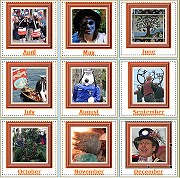
British Life & Culture
Unusual British Customs & Traditions
by Mandy Barrow
|
April / Easter
|
|||
|
Walpurgis Night, Beltane Eve Easter Palm Sunday Pax Cakes In 1570, to encourage good neighbourliness among parisherners, Lady Scudamore arrange for five shillingsworth of cake and ninepenn'orth of ale to be provided every Palm Sunday in four Herefordshire churches. Nowadays small biscuits stamped with the image of the Pascal Lamb and the words ' God and Good Neighbourhood' are distibuted at the church doors after the service. Good Friday Hot-Cross Buns Service St Bartholomew-the-Great, Smithfield. Starts 11.30
Easter Bun Ceremony A London pub in Bromley-by-Bow, holds an annual Easter Bun ceremony on Good Friday. Each year a sailor adds a hot cross bun to the many that hang already in commemoration of a poor widow who baked a bun for her only son that never returned from sea. Midgely Pace Egg Play - Calder Valley, West Yorkshire Easter Saturday (Visit our Holy Saturday Page) Nutters Dance - Bacup, Lancashire The Bacup Nutters Dance traditionally takes place on Easter Saturday in the small Pennine town of Bacup. Each year a team of folk-dancers with blackened faces dance through the town from boundary to boundary.
Visit our Easter Saturday page for more information Easter Sunday (See also our Easter Sunday Page) Egg Jarping and Egg Rolling - See our Easter Day page Easter Monday (See also our Easter Monday Page) London Harness Horse Parade- Easter Monday
At Hallaton in Leicestershire, the Hare Pie Scramble and Bottle Kicking, an unruly rugby game between the village of Hallaton and Medbourne, takes place every Easter Monday. Click here to find out more on our Easter Monday page
World Coal Carrying Championship - Nr. Wakefield in Yorkshire On Easter Monday, The World Coal Carrying Championship takes place in the village of Gawthorpe, in Yorkshire. Contestants run for one mile, carrying a 50kg bag of coal. History behind the custom Easter Tuesday Tuppenny Starvers Second Tuesday after Easter (Hock Day) This day used to be held as a festival in England and observed until the 16th century. According to custom, on Hock Monday, the women of the village seized and bound men, demanding a small payment for their release. On the Tuesday of Hocktide the men similarly waylaid the women. The takings were paid to the churchwarden for parish work. Hocktide Festival - Hocktide covers the Monday and Tuesday after Low Sunday which is the Sundy after Easter. It was once a time for sports and games, and for the collection for the church and parish. Hocktide Tutti-men The festival dates from the 14th century when Prince John of Gaunt gave the rights of free grazing and fishing to local 'commoners'. It has celebrated the granting of commoners’ rights for over 600 years. Hungerford has no Mayor; the senior citizen of the town is the Constable, and he s elected on the second Tuesday after Easter at a special Hocktide Court, as are also the Portreeve, Bailiff and the Court of Feoffes. The day begins with the Town Crier blowing his horn, calling together the Hocktide Court in the town hall. The court elects the Constable and other officers, and two "Tutti-Men". Each "Tutti-Man" carries a tall pole with a bunch of spring flowers (a tutti) tied to it with rbbons. There is an orange on the top. While the court continues, the "Tutti-Men" with their florally decorated poles are led through the streets by the "Orange-Man" to collect kisses from all the ladies resident in the High Street. The ladies receive an orange in return.
|
|||
|
© Copyright Mandy Barrow 2013
Mandy is the creator of the Woodlands Resources section of the Woodlands Junior website.
The two websites projectbritain.com and primaryhomeworkhelp.co.uk are the new homes for the Woodlands Resources.
Mandy left Woodlands in 2003 to work in Kent schools as an ICT Consulatant.
She now teaches computers at The Granville School and St. John's Primary School in Sevenoaks Kent.



 Hare Pie Scramble and Bottle Kicking
Hare Pie Scramble and Bottle Kicking




 ©
© 
